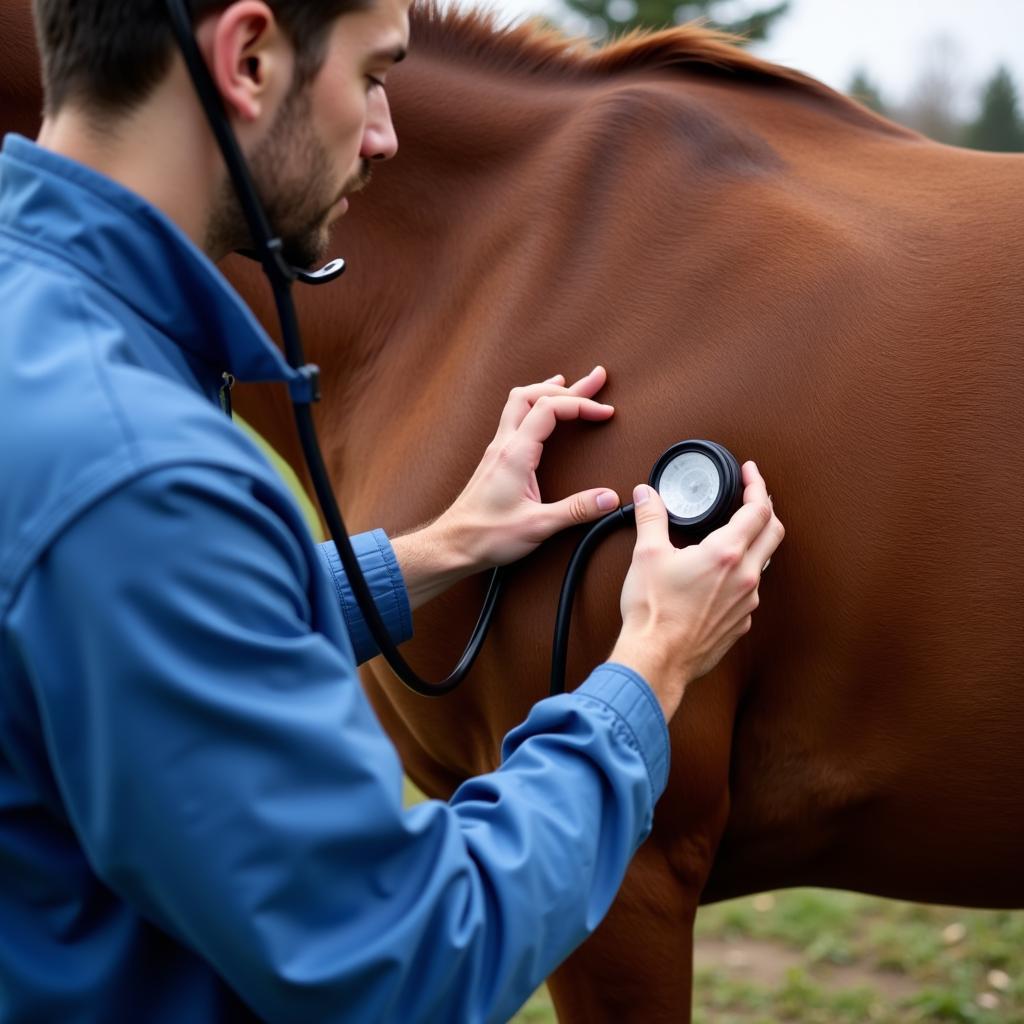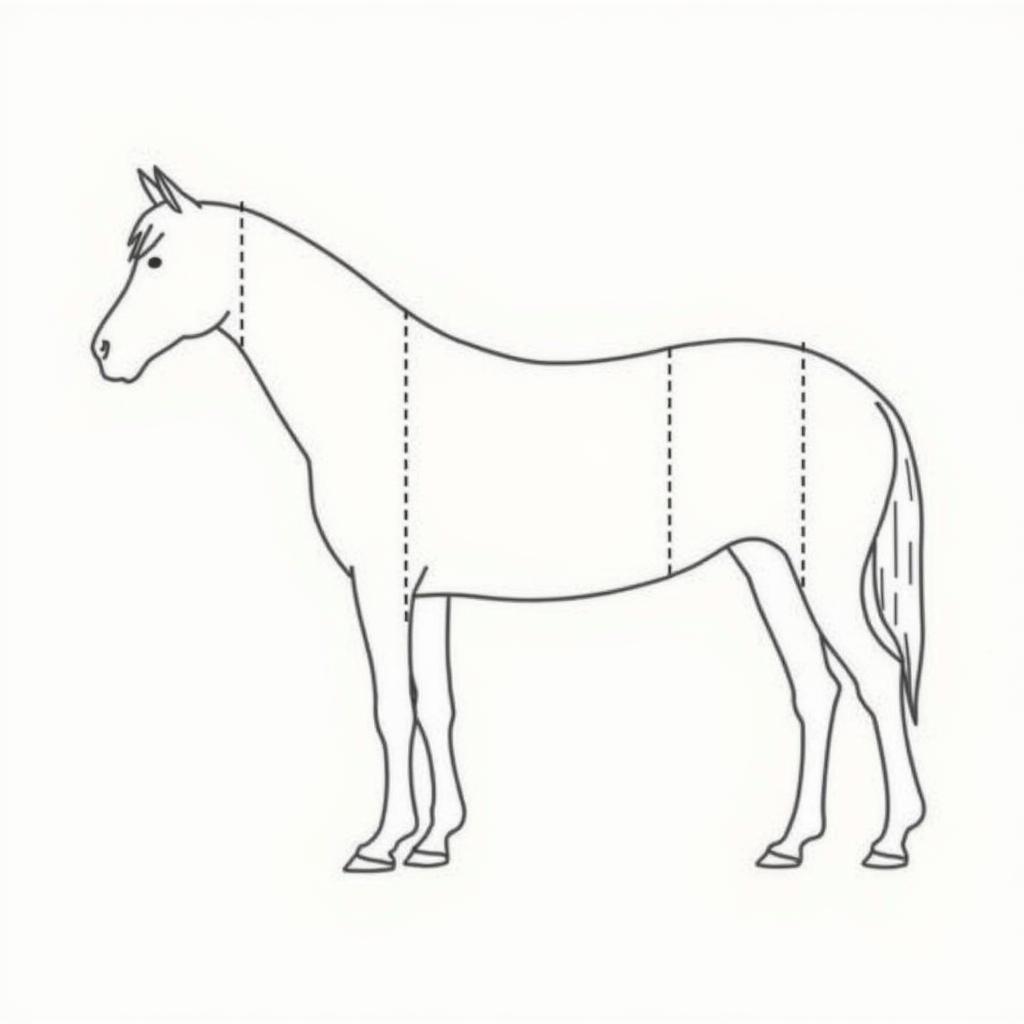Gut sounds, also known as borborygmi, are an important indicator of your horse’s digestive health. These sounds originate from the movement of gas and fluids within the horse’s gastrointestinal tract. Recognizing and understanding the different types of gut sounds is crucial for horse owners to detect potential problems early on and ensure their equine companions receive timely veterinary care.
The Importance of Listening to Your Horse’s Gut
Unlike many animals, horses cannot vomit easily, making a properly functioning digestive system even more critical. The equine digestive tract is a complex system, and any disruptions can lead to serious health issues. By regularly listening to your horse’s gut sounds, you can gain valuable insights into their digestive well-being.
 Veterinarian listening to a horse's gut with a stethoscope.
Veterinarian listening to a horse's gut with a stethoscope.
Normal Gut Sounds in Horses
A healthy horse will exhibit a symphony of gurgling, rumbling, and growling sounds emanating from their abdomen. These sounds result from the normal peristaltic movements that propel food, gas, and fluids through the digestive system.
Here’s what to listen for:
- Frequency: You should hear gut sounds in all four quadrants of your horse’s abdomen at least once every couple of minutes.
- Character: The sounds should be varied, ranging from low rumbles to higher-pitched gurgles.
It’s essential to familiarize yourself with your horse’s normal gut sounds. This baseline knowledge will help you identify any deviations that might signal a problem.
Abnormal Gut Sounds: When to Worry
While a quiet gut is a serious concern, increased or hyperactive gut sounds can also indicate a problem. Here’s a breakdown of abnormal gut sounds and their potential implications:
Reduced or Absent Gut Sounds (Ileus)
Reduced or absent gut sounds, also known as ileus, are often a sign of a serious problem and require immediate veterinary attention. Ileus can be caused by various factors, including:
- Colic: A broad term encompassing any abdominal pain, colic can disrupt normal gut motility.
- Intestinal Obstruction: Obstructions, such as those caused by impaction or displacement of the intestines, can halt gut movement.
- Electrolyte Imbalances: Imbalances in electrolytes can disrupt the muscle contractions necessary for peristalsis.
Increased or Hypermotile Gut Sounds
While less common than reduced sounds, increased or hypermotile sounds can also signal digestive upset. These sounds may be associated with:
- Gastroenteritis: Inflammation of the stomach and intestines can lead to increased gut motility.
- Spasmodic Colic: Certain types of colic, such as spasmodic colic, can cause intestinal spasms and increased gut sounds.
How to Listen to Your Horse’s Gut Sounds
Listening to your horse’s gut sounds is a straightforward process:
- Choose a Quiet Environment: Find a peaceful area where your horse is relaxed and less likely to be startled.
- Position Yourself Safely: Stand close to your horse’s shoulder, facing their hindquarters. Be mindful of their legs and avoid standing directly behind them.
- Use a Stethoscope (Optional): While not essential, a stethoscope can amplify the sounds, making them easier to hear. Place the stethoscope’s diaphragm against the horse’s flank, just below the point of their hip.
- Listen in All Four Quadrants: Divide your horse’s abdomen into four quadrants and listen to each for at least one minute.
- Note the Frequency and Character: Pay attention to how often you hear sounds and their quality (gurgling, rumbling, etc.).
 Diagram of the four quadrants for listening to horse gut sounds.
Diagram of the four quadrants for listening to horse gut sounds.
Tips for Monitoring Your Horse’s Digestive Health
In addition to listening to gut sounds, other practices can help maintain your horse’s digestive well-being:
- Provide Plenty of Fresh Water: Water is essential for digestion and helps prevent impaction colic.
- Feed a High-Quality Diet: Offer a balanced diet of hay, pasture, and a carefully selected concentrate feed, if needed.
- Introduce Dietary Changes Gradually: Abrupt changes in feed can disrupt the delicate balance of the gut microbiome.
- Establish a Regular Deworming Schedule: Consult with your veterinarian to determine an appropriate deworming program for your horse.
- Monitor for Changes in Manure: Any significant alterations in your horse’s manure, such as diarrhea or constipation, should be addressed promptly.
Conclusion
Paying close attention to your horse’s gut sounds is a simple yet powerful tool for safeguarding their digestive health. By understanding the different types of gut sounds and what they signify, you can become a more informed and proactive horse owner. Remember, early detection and intervention are key to successfully managing digestive issues and ensuring your equine companion lives a long and healthy life. If you are ever in doubt about your horse’s gut sounds or overall health, always consult with your veterinarian for professional guidance.
FAQs about Gut Sounds in Horses
1. How often should I listen to my horse’s gut sounds?
Ideally, you should make it a habit to listen to your horse’s gut sounds at least once a day. However, if your horse has a history of digestive issues or is showing other signs of illness, more frequent monitoring might be necessary.
2. Can stress affect a horse’s gut sounds?
Yes, stress can significantly impact a horse’s digestive system. Just like humans, horses can experience digestive upset when stressed, leading to changes in gut sounds and motility.
3. What should I do if I don’t hear any gut sounds?
Absent gut sounds are a serious red flag and require immediate veterinary attention. Do not attempt to treat the problem yourself. Contact your veterinarian immediately.
4. Are there any supplements that can improve gut health in horses?
Several supplements, such as probiotics and prebiotics, are marketed to support equine digestive health. However, it’s crucial to consult with your veterinarian before administering any supplements, as they can interact with medications or exacerbate certain health conditions.
5. Can changes in weather affect a horse’s gut sounds?
While weather changes alone might not drastically alter gut sounds in a healthy horse, they can contribute to stress or other factors that impact digestion. For instance, sudden shifts in temperature can suppress a horse’s appetite, potentially leading to digestive upset.
Need help finding the perfect name for your new equine partner?
Check out our free online tool: horse registered name generator. It’s a fun and easy way to generate unique and creative names for your horse.
Have more questions about your horse’s health or need personalized advice? Contact Justus Horses USA at Phone Number: 0772127271, Email: [email protected]. Our dedicated team of equine experts is available 24/7 to assist you. We’re located at QGM2+WX2, Vị Trung, Vị Thuỷ, Hậu Giang, Việt Nam.